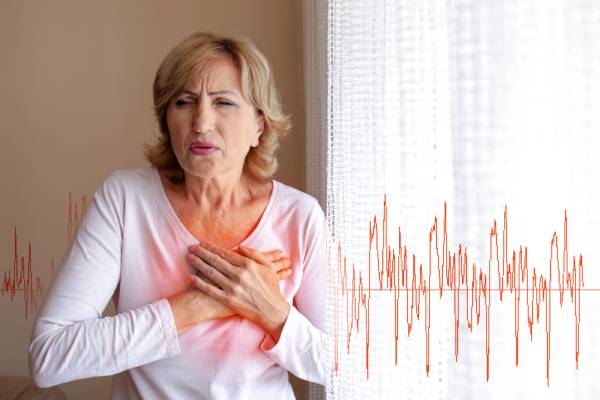
Palpitations affect the rhythm of your heartbeat, causing it to skip a beat or beat irregularly. Zaki Lababidi, MD, FACC, FSCAI, Sharolyn McClurg, NP, and the expert Cardiology At Home team in Gilbert, Arizona, provide convenient and accessible care for palpitations by offering evaluations through telehealth or home visits. Palpitations aren’t always a serious health concern but need an evaluation to rule out heart disease. If you can’t get to a doctor’s office, call Cardiology At Home or click the online booking button to schedule an evaluation that takes place at home.
What do palpitations feel like?
Palpitations cause a pounding or racing sensation you may feel in your chest or throat. You may also feel like the heart is skipping beats or taking long pauses in between beats. You may find the sensation unpleasant.
In some cases, the palpitations occur because of changes in the electrical activity that controls the heartbeat, causing it to beat out of sync or an arrhythmia.
Though not always a serious health concern, you should see your doctor when you have this sensation. They can refer you to the Cardiology At Home team if they have concerns the symptom is related to a heart condition.
What causes palpitations?
Palpitations occur from many causes. You may feel like your heart is going to beat out of your chest when you drink too much caffeine or feel overly anxious. Exercise and stimulant drugs can also cause palpitations.
However, palpitations are also a symptom of heart diseases like mitral valve prolapse and atrial fibrillation (AFib). AFib is a common but severe arrhythmia that increases the risk of stroke and congestive heart failure (CHF).
What can I expect during a cardiology evaluation for palpitations?
You can expect a patient-centered and thorough evaluation of your palpitations from the Cardiology At Home team. They want to find the cause of your irregular heartbeat so they can provide the most effective treatment plan.
Your doctor asks about your symptoms and when they occur. They review your medical and family history, your usual diet, the types of medications you take, and your exercise routine. They may also ask for health data like your height and weight, blood pressure, and heart rate.
The telehealth practice may have you use a Holter or event monitor, a portable electrocardiogram (EKG) that tracks the rhythm of your heartbeat. The devices electronically transmit the data to the team so they can check for an arrhythmia.
What can I do to stop palpitations?
The Cardiology At Home team spends time talking to you about your palpitations and the underlying cause. They may suggest lifestyle changes, such as decreasing caffeine intake, finding healthy outlets to reduce stress, and getting regular exercise.
If your palpitations are from an underlying heart condition, your doctor may prescribe heart medication or suggest placement of a pacemaker or an implantable cardioverter defibrillator (ICD) to keep the heart in normal rhythm.
Are you having heart palpitations? Call Cardiology At Home today or schedule an appointment online.
